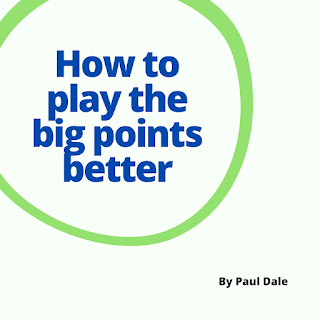HOW TO PLAY THE BIG POINTS BETTER
The important points in a match are the break points, game points, and set points. If, for whatever reason you are not converting these opportunities it's very tough to win matches.
Players often change their mindset for the important points and suddenly do things out of character. While they might have been playing calm, intelligent tennis for most of a set, when they get to the "business end" of the set they suddenly decide to play risky shots that they weren't attempting before.
To see a player suddenly change to risky low percentage shots at the most important times in the match is a coach's worst nightmare
Establish Patterns Early:
Start analyzing your opponent during the warm-up, and continue observing her throughout the match, just in case adjustments to your strategy are needed.
Look for obvious strengths and weaknesses based on The 8 Opposites method of analyzing opponents. You're looking for what they do really well, and also where they are making timing errors or mistakes. These observations will help you construct a plan to begin the match, particularly if you haven't seen your opponent play before.
 |
| The time to start thinking about strategy is during the warm-up and the first few games |
Stick with Established Patterns:
With established patterns that are working, you can play with confidence.
However, during the important points players can randomly come out of their proven patterns that were working for them and adopt poor shot selection. It's a coach's worst nightmare because these random moments of poor decision making can cost games, sets, and even matches.
When those big point moments come along in matches it's important for players to trust their patterns.
 |
| Learn to trust what is working when the big points come |
Play With a Strategy:
Starting matches with a strategy is like your anchor. It will help boost your confidence and be your compass during points.
Always start matches with 1-3 basic ideas on how to play your opponent and based on The 8 Opposites.
You're welcome to tweak your strategy from time to time but avoid making wholesale changes because of stress. Continuing to implement your strategy in the face of adversity is one of the most important things you do on big points.
 |
| Even just a few basic ideas of how you want to play will help anchor you strategically and emotionally |
Never Change a Winning Game...:
The great William "Bill" Tilden created the most iconic quote in tennis... "Never change a winning game, always change a losing one".
If you're losing badly in a match by all means change tactics. Unfortunately many players give up on their strategy or make drastic changes to their strategy too soon and for the wrong reasons.
When asked why they changed their strategy mid-match, a common excuse from players is "They started playing better so I had to change my tactics"
You need to be brutally honest when faced with a decision on whether you need to implement your strategy better, or change to other tactics completely.


%20copy.png)

I prefer not to say "Never change a winning game," because, unless your opponent is stupid or inept, they are not going to allow the same tactics to continue if they are losing. They will be thinking about what they can change and you need to be up with the game, or ahead of it, by thinking how you can subtly adapt what you are doing. If they were was 2-5 down in a set they might wait for the start of the next set to make a tactical change so there is a need to be aware of that with a big start to the new set rather than thinking that you should never change.
ReplyDeleteMany times a weakness can't be fixed "on the spot". Faulty technique, fitness issues, and plain skill limitations can be exploited. These are not easily fixed during the match.
ReplyDeleteHi Mr.Dale. I have the issue of forgetting the technique I learn during practice and start to revert to my old game in a tennis match. Is there a mindset I should have to commit to the changes?
ReplyDeleteHi John, I need to ask you if you have confidence in what you are being taught. If you fully trust that your coach is doing their bet for you and trying to improve your game. One way to help retain information is to put the new technique or strategy under stress often during practice points. By exposing new stuff to pressure it helps "cement" it into your normal game and building a bridge from the practice court to the match court. Good luck John!
Delete